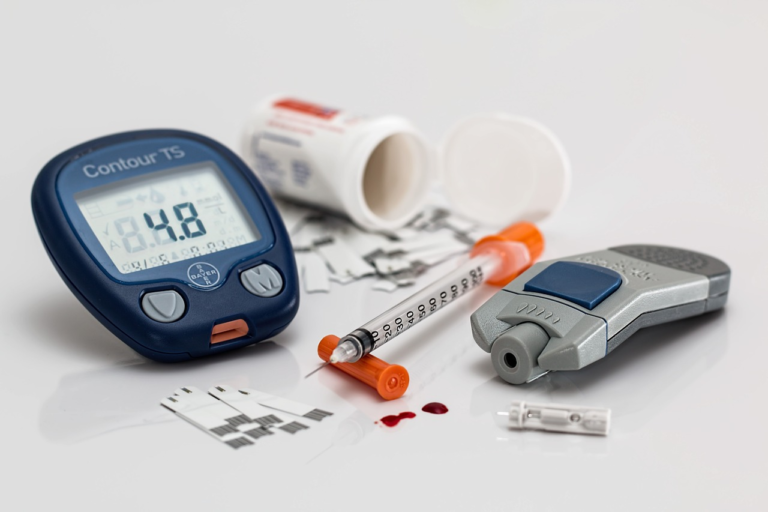The Latest Breakthroughs in Diabetes Treatment: What You Need to Know
#ez-toc-container {
background: #f9f9f9;
border: 1px solid #aaa;
border-radius: 4px;
-webkit-box-shadow: 0 1px 1px rgba(0, 0, 0, .05);
box-shadow: 0 1px 1px rgba(0, 0, 0, .05);
display: table;
margin-bottom: 1em;
padding: 10px 20px 10px 10px;
position: relative;
width: auto;
}
.ez-toc-container-direction {
direction: ltr;
}
.ez-toc-list-level-1 a{
font-weight:bold;
}
Table of Contents
1. Introduction to Diabetes and Current Treatment Challenges
Introduction to Diabetes and Current Treatment Challenges
Diabetes is a chronic health condition that stems from the body’s inability to effectively manage blood glucose levels. With its growing prevalence, diabetes poses significant public health challenges globally. Understanding diabetes begins with recognizing its various types and their impact worldwide. Additionally, addressing the limitations of existing treatments and the necessity for innovative research are crucial in improving patient outcomes.
Overview of the Global Prevalence and Types of Diabetes
Diabetes is a multifaceted disease categorized primarily into Type 1, Type 2, and gestational diabetes. Each type has distinct pathophysiological features:
- Type 1 Diabetes: An autoimmune condition where the immune system attacks the pancreatic cells, resulting in an absence of insulin production.
- Type 2 Diabetes: Characterized by insulin resistance and eventual insulin deficiency. It is the most prevalent form and is often associated with lifestyle factors.
- Gestational Diabetes: Occurs during pregnancy and can increase the risk of developing Type 2 diabetes later in life.
According to the International Diabetes Federation (IDF), an estimated 463 million people live with diabetes globally, and the number is projected to rise dramatically. This escalating prevalence underscores the urgent need for effective management strategies and innovative treatment options.
Limitations of Existing Treatment Modalities
Although there has been substantial progress in diabetes management over the years, several limitations persist concerning existing treatment modalities:
- Insulin Therapy Challenges: Many patients with diabetes, particularly those with Type 1, rely on insulin. However, daily insulin injections can be burdensome and challenging to manage, often leading to poor compliance.
- Oral Hypoglycemics: While these agents are pivotal in Type 2 diabetes management, they may not address the deterioration of pancreatic function over time and can have side effects that limit their use.
- Impact of Lifestyle Management: Lifestyle interventions are essential; however, their efficacy is often limited by factors like patient motivation, socioeconomic constraints, and accessibility to resources.
- Monitoring and Management: Achieving optimal blood glucose control requires frequent monitoring, which can be intrusive, and navigating the complexities of diabetes management can be overwhelming for patients.
Given these challenges, it is indispensable to explore and embrace innovative research that promises better management and outcomes for diabetes patients.
Importance of Innovative Research and Breakthroughs in Improving Patient Outcomes
The dynamic field of diabetes research plays a crucial role in identifying new therapeutic approaches and improving existing ones. Innovations in diabetes care focus on several key areas:
- Technological Advances:
- Continuous Glucose Monitoring (CGM) systems provide real-time data, enhancing blood glucose oversight and aiding in more precise medication adjustments.
- Insulin pumps and artificial pancreas systems are revolutionizing diabetes management by automating insulin delivery based on glucose readings.
- Pharmacological Innovations:
- The development of ultra-long-acting insulin analogues helps reduce the frequency of dosing and mimic natural insulin patterns more closely.
- Emerging classes of medications like SGLT2 inhibitors and GLP-1 receptor agonists not only aid in glucose control but also help reduce cardiovascular risks associated with diabetes.
- Genetic and Cellular Research:
- Advancements in stem cell research and beta-cell regeneration hold the potential to offer cures by restoring natural insulin production.
- Genetic insights could pave the way for personalized medicine, tailoring treatment approaches based on an individual’s genetic makeup.
- Patient-Centered Approaches:
- An emphasis on patient education and engagement ensures better adherence and empowers individuals in managing their health effectively.
- Interdisciplinary care models that integrate dietitians, psychologists, and diabetes educators offer holistic support to address the multifaceted needs of patients.
Investing in these innovative research areas is vital for the future of diabetes management, moving towards more effective, personalized, and patient-friendly solutions.
In summary, as diabetes continues to affect millions globally, a comprehensive understanding of its types and challenges is essential. The limitations of existing treatment options highlight the pivotal role of pioneering research. Through continuous innovation, there is great promise for enhancing patient outcomes and achieving better control over diabetes.

2. Cutting
In the ever-evolving landscape of diabetes management, recent developments in medication have provided renewed hope for patients and healthcare providers. With the FDA’s rigorous approval process, only the most effective and safe medications make it to the market, ensuring high-quality care for those living with diabetes. This segment delves into cutting-edge medication developments, focusing on recently FDA-approved drugs for diabetes management, advances in oral and injectable therapies, and the implications these have on glucose control and patient lifestyle.
Recent FDA-approved Medications for Diabetes Management
The FDA’s approval of new diabetes medications is a milestone in the ongoing battle against this chronic condition. These approvals are crucial as they open the doors to more effective therapies that can cater to the unique needs of each individual with diabetes.
- Orforglipron: Orforglipron is a novel oral medication that has shown great promise in controlling blood sugar levels. As a non-peptide glucagon-like peptide-1 (GLP-1) receptor agonist, it offers a convenient alternative for patients who prefer oral administration over injectables. Its once-daily pill form optimizes compliance and caters to the lifestyle needs of patients who seek simplicity.
- Tirzepatide: Recently approved, Tirzepatide is a dual glucose-dependent insulinotropic polypeptide (GIP) and GLP-1 receptor agonist. This injectable therapy is designed to offer significant improvements in glucose control while also facilitating weight loss. Its dual-action mechanism represents a breakthrough in diabetes treatments, offering enhanced efficacy compared to existing single-action drugs.
Advances in Oral Drugs and Injectable Therapies
The convergence of innovative science and clinical practice is crucial in developing new therapies that can manage diabetes more effectively. Recent advances in both oral drugs and injectables are reshaping treatment paradigms and offering new hope for comprehensive diabetes management.
-
Oral Drugs
- SGLT2 Inhibitors: These inhibitors work by preventing the kidneys from reabsorbing glucose, promoting its excretion through urine. Recent advancements have led to the development of more potent versions, offering not just glucose control but also cardiovascular benefits.
- Non-Peptide GLP-1 Receptor Agonists: The introduction of oral GLP-1 receptor agonists marks a substantial advance, especially for patients wary of injections. These medications help in regulating appetite, improving insulin sensitivity, and supporting weight management.
-
Injectable Therapies
- Dual Agonists: The dual action of combined GIP and GLP-1 receptor agonists represents an innovative step. These injectables not only enhance glucose control but also have the added advantage of promoting weight loss, which is often a challenging aspect of diabetes management.
- Insulin Analogues: The development of ultra-long-acting insulin analogues has improved baseline insulin therapy, reducing the frequency of dosing and minimizing the risk of hypoglycemia.
Implications of These Medications on Glucose Control and Patient Lifestyle
The introduction of these cutting-edge medications is more than just a scientific triumph; it has significant implications on how patients manage their diabetes daily. Beyond glucose control, these advancements play a pivotal role in enhancing patient lifestyle and long-term health outcomes.
- Improved Blood Glucose Regulation: With the advent of these medications, patients can expect more consistent blood glucose levels. This reduces the risk of complications associated with both hyperglycemia and hypoglycemia, facilitating a more stable diabetic life.
- Enhanced Adherence and Quality of Life: The convenience of once-daily oral medications and the extended duration of action of injectables reduce treatment burden. This not only improves adherence but also allows patients to lead more flexible and independent lives.
- Weight Management Benefits: Medications like Tirzepatide offer dual benefits of glucose control and weight loss, addressing two critical aspects of diabetes management. This can lead to improved confidence and overall health and wellness.
In conclusion, the landscape of diabetes management is undergoing significant transformations thanks to recent advancements in medications. These FDA-approved drugs not only offer more robust therapeutic effects but also improve patient adherence and lifestyle. As research continues to unfold, we anticipate even greater strides towards holistic and personalized diabetes care.

3. Technological Innovations in Diabetes Management
In recent years, technological innovations have dramatically enhanced the management of diabetes, offering new opportunities for improved health outcomes and lifestyle changes. This emerging landscape is revolutionizing how individuals monitor and manage their condition. Here, we delve into three key areas shaping the future of diabetes care: the latest glucose monitoring technologies, the role of artificial intelligence in personalized diabetes management, and the benefits and drawbacks of automated insulin delivery systems.
Introduction to the Latest Glucose Monitoring Technologies
The relentless pursuit of accuracy, convenience, and comfort in glucose monitoring has led to several groundbreaking technologies. Traditional finger-pricking tests are being supplemented or even replaced by advanced solutions that promise a less invasive and more continuous approach.
- Continuous Glucose Monitors (CGMs): CGMs are transforming diabetes care by providing real-time data on glucose levels. Unlike the conventional glucose meters, CGMs utilize sensors implanted under the skin to continuously measure glucose levels, delivering more detailed insights into blood sugar trends and patterns.
- Flash Glucose Monitoring: This technology allows users to scan a sensor with a reader or smartphone to obtain their current glucose value and recent trends. Unlike traditional CGMs, flash monitoring devices do not alert the user of highs or lows unless they are scanned.
- Non-Invasive Glucose Monitoring: Though still in development, non-invasive methods aim to measure glucose levels without penetrating the skin, using techniques such as spectroscopy or ultrasound.
The technological innovations within these areas offer greater accuracy and less intrusion, facilitating easier day-to-day management of diabetes.
The Role of Artificial Intelligence in Personalized Diabetes Care
Artificial Intelligence (AI) is at the forefront of creating personalized diabetes management plans by processing extensive datasets to provide actionable insights.
- Predictive Analytics: AI algorithms can analyze vast amounts of health data to predict blood sugar fluctuations, allowing individuals to take proactive measures.
- Personalized Treatment Plans: AI-driven tools can suggest tailored recommendations based on personal health profiles, dietary habits, and physical activity levels.
- Enhanced Decision-Making: AI-powered applications aide patients and healthcare providers in making informed decisions faster, considering variables that humans might overlook.
Harnessing the potential of AI can lead to enhanced patient engagement and optimized outcomes in diabetes management.
Benefits and Drawbacks of Automated Insulin Delivery Systems
Automated insulin delivery systems, or artificial pancreas technologies, offer significant prospects for individuals with diabetes. By automating the insulin delivery process, these systems can help maintain blood glucose levels more effectively.
Benefits:
- Improved Blood Glucose Control: Automated systems adjust insulin doses based on real-time glucose levels, leading to more precise control.
- Convenience: The automation reduces the burden of calculating and administering insulin manually.
- Quality of Life: With fewer incidences of hyper- or hypoglycemia, users can enjoy a better quality of life.
Drawbacks:
- Complexity and Cost: Advanced systems may be complex to use without adequate training, and their costs could be prohibitive for some individuals.
- Technical Issues: Malfunctions in the system could lead to insulin delivery errors, posing risks for users.
- Dependence on Technology: Overreliance on automated systems might lead to diminished awareness and understanding of one’s own glucose patterns.
While automated insulin delivery systems represent a significant leap forward, weighing their benefits against potential drawbacks is crucial for informed decision-making.
The journey of technological advancements in diabetes management is an evolving narrative. Continuous research and development are pivotal in refining these technologies to enhance their effectiveness and accessibility for all individuals living with diabetes.
4. Breakthroughs in Diabetes Research
Diabetes is one of the leading chronic conditions affecting millions of people worldwide. Recent discoveries and advancements in diabetes research offer hope for more effective treatment options and even potential cures. In this segment, we’ll delve into some of the most promising breakthroughs, focusing on beta-cell regeneration, stem cell therapy, genetic studies, and recent clinical trials.
Breakthroughs in Beta-Cell Regeneration and Stem Cell Therapy
At the heart of diabetes research lies the quest to find ways to regenerate beta cells. These insulin-producing cells play a crucial role in regulating blood sugar levels and are usually dysfunctional or destroyed in diabetes patients.
-
Beta-Cell Regeneration:
Research in beta-cell regeneration aims to restore the population of functioning beta cells within the pancreas. One promising avenue is using small molecules and proteins that can stimulate the pancreas’s own ability to regenerate beta cells. This approach has yielded positive results in animal models, showing potential for human applications.
-
Stem Cell Therapy:
Stem cells offer a groundbreaking avenue for diabetes treatment by providing a renewable source of insulin-producing cells. Scientists are working on differentiating pluripotent stem cells into beta cells. This technique has prompted significant advancements, with some clinical trials already starting to assess the safety and efficacy of stem cell-derived beta cells in patients.
Genetic Studies and Their Potential Impact on Diabetes Prevention
Genetics plays a pivotal role in diabetes, especially Type 1 diabetes (T1D) and Type 2 diabetes (T2D). Understanding genetic factors opens new pathways for predicting, preventing, and managing the disease.
-
Genetic Markers:
Cutting-edge research has led to identifying specific genetic markers linked to an increased risk of developing diabetes. These markers can be used to screen individuals at high risk, allowing for early intervention strategies to prevent the onset of the disease.
-
Precision Medicine:
The concept of precision medicine relies heavily on genetic profiles. By understanding an individual’s genetic makeup, healthcare providers can tailor lifestyle changes and medical treatments to manage and prevent diabetes more effectively. This personalized approach aims to maximize treatment success while minimizing side-effects.
Recent Clinical Trials and Their Outcomes
Clinical trials are essential for testing new treatments and interventions, providing crucial data for regulatory approvals and safe public use. Recent trials in diabetes research have yielded some promising results.
-
Trial 1: Artificial Pancreas Systems
Recent clinical trials have investigated the efficacy of artificial pancreas systems, which automate insulin delivery based on real-time glucose monitoring. Outcomes from these trials suggest significant improvements in glucose control for individuals with T1D, resulting in better long-term health outlooks.
-
Trial 2: Immunotherapy in T1D
Immunotherapy trials are exploring ways to modify the immune response in T1D. Recent results have shown promise in preserving remaining beta-cell function, thereby improving patients’ ability to produce insulin naturally. Although still in early phases, these trials herald a new frontier in T1D management.
-
Trial 3: Novel T2D Medications
For T2D, clinical trials involving novel medications such as SGLT2 inhibitors and GLP-1 receptor agonists have demonstrated enhanced glycaemic control and weight loss benefits. These medications are paving the way for more comprehensive and side-effect reducing treatment plans.
In conclusion, the continuous strides in diabetes research are a testament to the scientific community’s dedication to overcoming one of the world’s most challenging health conditions. From beta-cell regeneration and stem cell therapy to genetic studies and innovative clinical trials, these breakthroughs are not only providing hope but are charting a fast track towards effective management and, ultimately, a cure.







